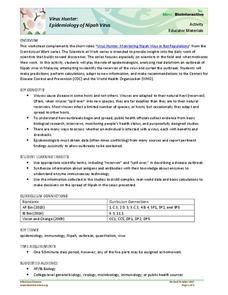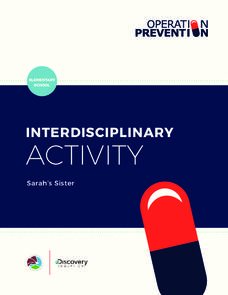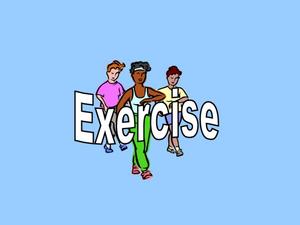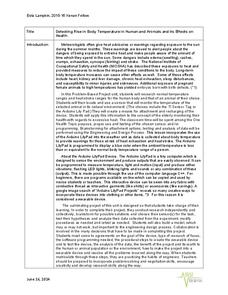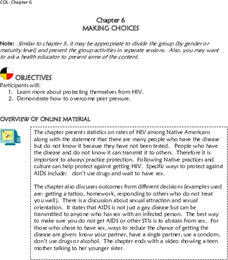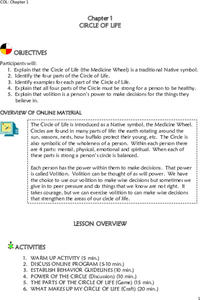TED-Ed
Sugar: Hiding in Plain Sight
Did you know that you can find added sugars in three-quarters of the foods you find in grocery stores? Invite your learners to consider how much sugar exists in the food products we eat on a day-to-day basis, as well as to learn about...
Curated OER
Health Related Fitness Portfolio
Students develop and implement a fitness station. Students base their exercise stations upon flexibility, muscular strength, and endurance. They complete a health related fitness portfolio. Students design and take a fitness survey.
Howard Hughes Medical Institute
Virus Hunters: Epidemiology of Nipah Virus
Who actually goes looking for a virus? Expose your class to the high-stakes life of an epidemiologist on the trail of the Nipah virus. Pupils engage in a short video, then examine how scientists predict, model, and find the source of...
National Save
Dating Violence: Are You a Victim?
The teenagers in your class are probably involved in romantic relationships, but are they keeping themselves safe? Guide learners through the warning signs for dating violence with a series of lessons and discussions.
Discovery Education
Sarah's Sister
Does it matter where medication is stored in your home? Absolutely. The best way to identify proper and improper storage of medications is to participate in different role-play scenarios. A lesson models the safe storage of medications...
Curated OER
Emotional Health Awareness
Students examine their emotional health. For this health lesson, students discover the differences between physical, mental, and emotional health. Students consider how to maintain balance in their own lives.
Scholastic
Recovery From Drug Addiction
Are there factors that put some individuals at a higher risk for drug addiction than others? Learn more about the risk factors that may make some people more susceptible to addiction, as well as protective factors that help prevent...
PBS
Stories of Painkiller Addiction: The Cycle of Addiction
Drug addiction, including prescription drug addiction, begins with a reason that's different for every user. High schoolers learn more about the reasons people begin abusing drugs with a set of videos and worksheets that discuss four...
PBS
Stories of Painkiller Addiction: Myth or Fact
Are opioids the most abused drug after marijuana? How hard is it for young people to obtain painkillers without a prescription? Middle and high schoolers explore the growing epidemic of opioid addiction with a lesson that prompts them to...
PBS
Stories of Painkiller Addiction: Learning About Opioids
Feeling high is not the only side effect of abusing prescription opioids. Middle and high schoolers learn more about specific painkillers, including Fentanyl, Oxycodone, and Clonazepam, as well as their common brand names and extensive...
John Hopkins University
Diets and Influence on Food Choice
From start to finish, this is a truly excellent lesson plan addressing the epidemic of diet-related disease in the United States. Learners begin with a reading excerpt of detailed information on trends in the American diet and the...
Curated OER
Middle-Class Women Provide Maternity Health Services for Immigrant Women
Students examine how different groups gave health services to pregnant immigrant women. They analyze the class and ethnic tensions during this time period. They work together in groups to read articles and answer questions.
Curated OER
Exercise: ESL Lesson
Save yourself a trip to the gym with this ESL presentation about exercise. Vocabulary words like jogging, yoga, and bicycling, as well as pictures that explain each activity, will help your English learners understand the common terms...
Missouri Department of Elementary
Community Wellness Fair
Seniors work with teachers, counselors, and administrators to organize a community wellness fair. Committees take on the responsibility for the various tasks (publicity, set up, hospitality room, agency contact, thank you letters, etc.)....
King Country
Lesson 24: HIV/AIDS & Other STDs - Day 1: Germs & Risk
This first lesson plan on sexually transmitted diseases focuses on germs, what they are, how they travel, and methods of protecting oneself from germs.
Kenan Fellows
Detecting Rise in Body Temperature in Human and Animals and its Effects on Health
Beat the heat using sensors. Scholars research normal body temperatures for humans and a specific animal. In groups, they create sensors that monitor body temperature, as well as the weather. The goal is to reduce the occurrence of heat...
Curated OER
Lesson 23: Reproduction - Day 5: Birth Control
High schoolers with mild to moderate disabilities discuss human reproduction and the importance of preventing pregnancy. They review reproductive anatomy, sexual decision making, and what birth control is. The lesson concludes with a...
Peel-Public Health
What Is Respiratory Infection?
Empower your pupils to be germ stoppers! The heart of these lessons lies in stopping the spread of germs and keeping clean hands in order to prevent cases like a respiratory infection. It includes a game to simulate how germs can...
Cancer Care
What is Breast Cancer?
How gets breast cancer? What are the hereditary risk factors? Can individuals reduce their risk factors? If you are looking for a resource to use during October's in Breast Cancer Awareness Month, check out the lessons in this packet.
Healthy Native Youth
Chapter 6: Making Choices
A lesson looks closely at risky behavior such as teen pregnancy and sexually transmitted diseases. Middle schoolers use a question box to ask questions anonymously. They role-play what life would be like if they became pregnant then...
Healthy Native Youth
Chapter 2: Learning About Adolescence
The Native American symbol, The Circle of Life, represents life's spiritual, physical, mental, and emotional well being. By way of deep discussion, and two games, the lesson uses the Circle of Life to explore the stages of...
Healthy Native Youth
Chapter 1: Circle of Life
Volition, or will-power, is the focus of a lesson that brings forth the Native symbol, the Circle of Life, to instill the importance of responsible decision-making. Scholars take part in six activities that empower them to reflect on...
CCEA
Home Economics: Teen Building
Learners explore the emotional and nutritional needs of teenagers in a six-lesson unit, which covers such topics as food sources, cooking skills, emotional well-being, and the positive effect of food and family occasions.
Common Sense Media
Going Places Safely
How can places on the Internet be dangerous? Youngsters draw important connections between traveling online and staying safe in the real world. They also discover three key online safety rules to guide them throughout their...




